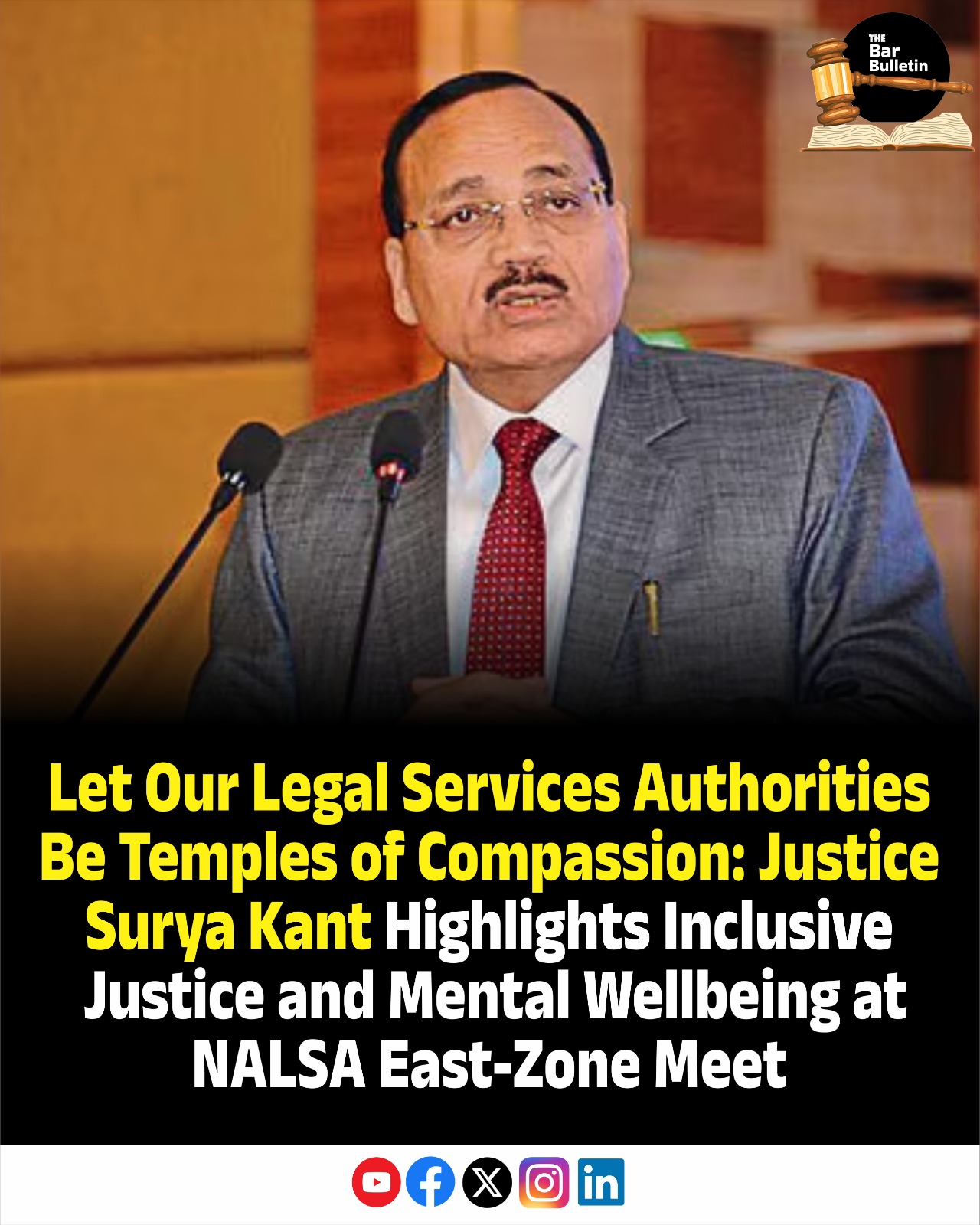The East-Zone Regional Conference of the National Legal Services Authority (NALSA) was inaugurated on 11th October, 2025 in Guwahati by Hon’ble Mr. Justice Surya Kant, Executive Chairman, NALSA. The two-day conference is being jointly organised by the Assam State Legal Services Authority (SLSA) and the Gauhati High Court, under the patronage of Hon’ble Mr. Justice Ashutosh Kumar, Chief Justice, Gauhati High Court and Patron-in-Chief, Assam SLSA.
The inaugural ceremony was graced by the presence of Dr. Himanta Biswa Sarma, Hon’ble Chief Minister of Assam, Shri Arjun Ram Meghwal, Hon’ble Minister of State (Independent Charge) for Law & Justice, Government of India, along with esteemed Judges of the Supreme Court of India, and distinguished Chief Justices and Judges from various High Courts across the country.
In his keynote address, Justice Surya Kant described the conference as “not merely an inauguration, but a reaffirmation that our commitment to justice must reach where it has so far been slow to travel across the valleys, tea gardens, and borderlands of India’s East.” He lauded the organisers for conceiving a conference that recognises the historical inequities and structural barriers faced by Eastern and Northeastern States, noting that “Assam, the land of red river and blue hills, stands as a symbol of beauty, resilience, and cultural harmony.”
While celebrating the region’s diversity, he also drew attention to the paradox of abundance and vulnerability, where natural wealth and cultural richness coexist with social challenges. “True progress,” he said, “is not measured by GDP, but by whether justice, dignity, and opportunity are equitably distributed.”
Justice Surya Kant identified a set of urgent issues confronting the East-Zone States, including child marriage, narcotics abuse, displacement of tribal communities, exploitation of tea garden workers, and mental health distress. He observed that despite positive trends, “child marriage continues to deny education and opportunities to millions of girls, while drug-related offences, particularly in Assam, have multiplied and destabilised communities.” He also expressed concern over the plight of over five million tea garden workers in Assam and Bengal who continue to struggle for fair wages, healthcare, and safe living conditions.
Marking the close proximity of the conference to World Mental Health Day (October 10), Justice Surya Kant gave special emphasis to mental wellbeing, calling it an often overlooked dimension of access to justice. “Legal empowerment cannot exist in isolation from mental health. We must build systems that heal, not only those that adjudicate,” he stated, urging NALSA and State Legal Services Authorities to integrate psychological support and counselling into legal aid frameworks.
“These are not isolated concerns,” Justice Surya Kant said. “They are chapters of one story, a story of structural vulnerability that calls for shared resolve, shared compassion, and shared innovation.”
He highlighted NALSA’s flagship initiatives that seek to translate policy into people-centred justice, including:
• DAWN (Drug Awareness and Wellness Navigation) promoting prevention and rehabilitation over punishment through more than 700 units nationwide;
• ASHA (Action against Sexual Harassment and Child Marriage) offering education, counselling, and livelihood support to rescued girls;
• SAMVAD, strengthening access to justice for Adivasi and Denotified Tribes through culturally sensitive outreach;
• Legal Services for Workers in the Unorganised Sector upholding fair wages, safety, and dignity as constitutional entitlements; and the NALSA Veer Parivar Sahayata Yojana 2025, providing legal aid and assistance to the families of defence personnel in border regions.
“These are not isolated schemes,” he remarked, “but pillars of an architecture of care rooted in the Indian ethos of ‘Manav Seva Hi Madhav Seva’ service to humanity is service to the divine.”
Justice Surya Kant called upon participants to ensure that the conference’s deliberations yield practical outcomes that touch lives on the ground. “Our success will not be measured by eloquence, but by whether a child in Bihar is saved from a premature marriage, a youth in Nagaland is freed from addiction, or a tea worker’s family in Assam receives justice and dignity,” he said.
Urging stronger collaboration between legal services institutions, social agencies, and mental health professionals, he emphasised the need for technology-driven, empathetic, and locally responsive justice delivery. “We must think regionally, act locally, and most importantly, listen with empathy,” he concluded.
Ending his address on a reflective note, Justice Surya Kant invoked the teachings of the revered Assamese saint Srimanta Sankardev, observing that “God resides in human compassion.” He urged all legal services institutions to embody this spirit, saying, “Let our institutions remain temples of compassion. Let this conference reaffirm that justice in the East shall not remain an abstraction, but be lived and felt in the lives of our people.”.”

